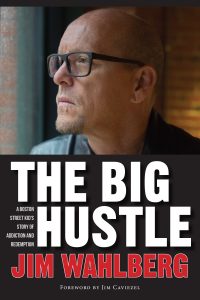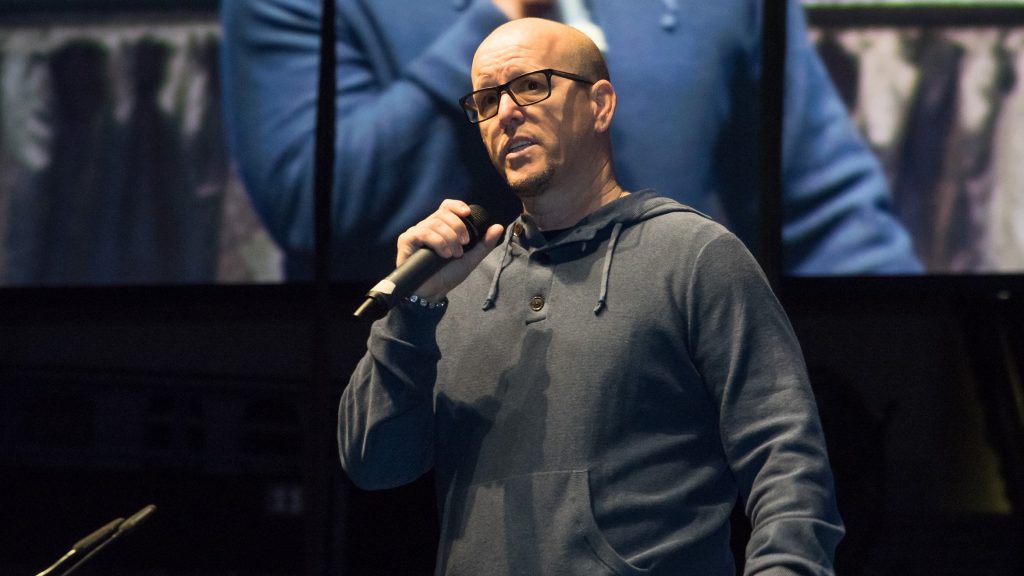The Wahlbergs are many. There's actor Mark, actor-rapper Donnie, and Wahlburgers chef and subsequent reality-TV star Paul.
Enter Jim Wahlberg. He's the fourth brother to have made a mark in media.
He has produced all 94 episodes of the "Wahlburgers" reality show over five years on the A&E cable channel, which features Paul, Mark and Donnie. But Jim Wahlberg also is the producer, writer and director of two short features: "The Circle of Addiction: A Different Kind of Tears" and "What About the Kids?"

This is the book cover of "The Big Hustle" by Jim Wahlberg. (CNS photo/courtesy Pinkston)
Wahlberg also has written a memoir, published by Our Sunday Visitor, called "The Big Hustle: A Boston Street Kid's Story of Addiction and Redemption." So there is no doubt, Wahlberg himself is that Boston street kid.
In the slender volume -- under 160 pages -- Wahlberg writes about his chaotic upbringing in a family of nine children which led to smoking, then drinking, then drugs, then crime, then homelessness after being thrown out of the house by his father while still a minor, then jail.
When a priest-chaplain at the jail where Wahlberg was imprisoned asked him to help out in the chapel, Wahlberg thought he could leverage it into yet another hustle, but it turned out God was the one doing the hustling of Wahlberg.
"I had considered writing a book over the years," Wahlberg told Catholic News Service Nov. 2 while on his way to a business lunch in Fort Lauderdale, Florida, but two previous offers from other publishers had left him feeling less than satisfied.
"My real intention was to make a movie with them (Our Sunday Visitor). When I met with them and sat with their team, it just felt right," he said. "They seemed interested in telling the story I wanted to tell from a faith-filled perspective."
With a ghostwriter, "we met over the course in personally maybe four, five days," Wahlberg said. "We spent entire days in Boston. I took him around, showed him where I lived, showed him where I suffered, where I froze at night sometimes, the prison I had been in."
But back to Wahlberg meeting with Our Sunday Visitor with a film script in hand.
"I was never really drawn to anything in front of the cameras. I was always drawn into telling stories," he said. "It was sort of the beginning of the opioid epidemic. I heard all these stories about people losing family members."
He said he "wanted to do something to create the opportunity for a conversation." "I had been involved in producing some, but it was all -- it might have been raising money for a move, setting a story from point A to point B, but it was never really a passion thing," he explained.
"This film ('If Only') was a passion. We did it and it was so well-received, 2,000 people show up to the premiere. It was people that had suffered greatly as a result of this epidemic," Wahlberg said.
"If Only" follows the story of two teenage boys who experiment with and become addicted to drugs. Wahlberg co-wrote and co-produced the short 2015 film.
"People showed up for this thing, and we started getting requests: Could you come to our community and facilitate a conversation about this epidemic? Because people were losing loved ones, and it was all walks of life, all throughout the country. I thought I was going to go back to my day job," he said. "I ended up saying to God, 'Whatever you're calling me to do, I'm going to say yes and leaving it in your hands.'"
"I've shown that particular film to over a quarter of a million people in person at events," he added. "All of a sudden, in the blink of an eye, it was five years later, and I'm still talking about this epidemic, still trying to educate young people, still trying to educate families about an epidemic."
"I've made 12 films on addiction," he noted.
Asked about making amends over his actions as a young hellion, Wahlberg told CNS that he is in a 12-step program that "gives me specific direction on how to go about the mechanics of that."
"When I went to my mom," he said, to "try to talk to her and make amends to her, she said, 'You're living it. I don't need to hear the words. The way you live your life, the way you serve others, is amends enough for me.'"

